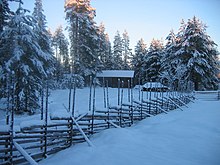This article includes a list of general references, but it lacks sufficient corresponding inline citations. (January 2022) |


The roundpole fence is a wooden fence typical to the countryside in Sweden (in Swedish: gärdesgård, gärdsgård, gärsgård), Norway (in Norwegian: skigard), Finland (in Finnish: riukuaita, risuaita or pistoaita) and Estonia (in Estonian: roigasaed or teivasaed). It is normally made from unbarked and unsplit youngish trees,[1] mostly spruce or juniper. Roundpole fences have traditionally been used as a means of fencing off animals rather than marking property boundaries.
The fence construction generally consists of 3 or 4 parts: uprights put together in pairs, round poles laid horizontally or diagonally between the two uprights, and binding cord usually made from young saplings - and sometimes also diagonal bracing. The fence is usually 1.5–2 metres tall. The fencing can also incorporate specially made stiles and gates. The fence requires an abundance of wood, which was never a problem in Scandinavia, as the trees generally came from the owners' own forests in the process of thinning them out. The term ″roundpole fence" is somewhat misleading, as the rails between the pairs of uprights are usually split spruce logs. However, the upright poles are always round, young spruce trees with a diameter of 5 to 7 cm. For the diagonals, larger trees with a diameter up to 20 cm were split into four or eight rails of suitable dimensions. Very young saplings were used to bind the rails to the uprights, the idea being to utilize trees of different ages. In more recent times, rough sawn boards have also been used, preferably the outer boards of a log, with one curved side. The binding of saplings have also been replaced by steel wire.
The oldest known roundpole fence dates back to the Iron Age. The oldest known archeological find of a roundpole fence in Sweden was uncovered in Leksand.
- ^ Halliday, Sandy (2008). Sustainable Construction. Butterworth-Heinemann. ISBN 9780750663946.